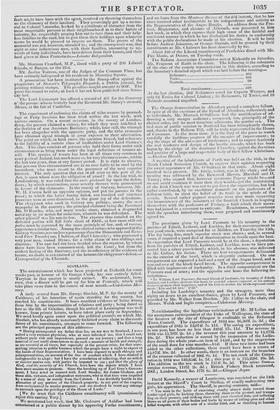The experiment of enforcing the claims of tithe-owners by proceed-
ings at Petty Sessions has been tried within the last week, with various success. On a recent occasion, in the county of London- derry, the parsons claimed a victory, for which they were indebted to the decision of one Assistant Barrister; while, later still, the triumph Las been altogether with the opposite party, and the tithe recusants bave obtained signal triumph at great expense to their adversaries. The point on which, in both cases, the question hinged, had reference to the liability of a certain class of landholders under Lord Stanley's Act. This class consists of persons who hold their farms under such circumstances as bring them under the legal definition of tenants-at- will. This species of tenure has been at all times very common in most p Ins of Ireland, but much more so, for very obvious reasons, within the last two years, than at any former period. It is right to observe, that persons thus circumstanced are in no case liable to be sued by the incumbent, who must resort to the possessor of the next superior interest. The only question that can at all arise on this part of the Act, is upon whom rests the obligation of proof? In the late trial, in Londonderry, it was ruled that the onus probandi lay upon the defen- dants; by which construction, souse seventy decrees were pronounced in favour of the claimants. In the county of Galway, however, Mr. W. H. Curran held an opposite opinion, and put the parsons to the proof; in which the latter having failed, one hundred and nineteen processes were at once dismissed, to the great joy of the defendants. The clergymen who sued in Galway are, perhaps, among the most unpopular in the country; the principal claimant being the Reverend Mr. O'Rourke, who, not many weeks since, obtained a disgraceful notor:ety in an action for seduction, wherein he was defendant. The other plaintiff was his son-in-law. The expense thus entailed on the defeated parties will fall little short of 1000L, as four cases still sub judiee must be governed by the same principle of law, and, of course, experience a similar fate. Among the clerical suitors who appeared at the Galway Sessions,was no less a personage than the Honourable and Reve- rend Poor Trench (son, I believe, of Earl Clancarty) ; who processed a very poor man, named Hynes, for a tithe claim of two shillings and sixpence. The case had not been decided when the reporter, by whom these facts have been communicated, left the Court ; but from the evident feeling of the Barrister, and the insufficiency of the evidence of tenure, no doubt is entertained of the honourable clergyman's defeat.— Correspondent if the Chronicle.


























 Previous page
Previous page